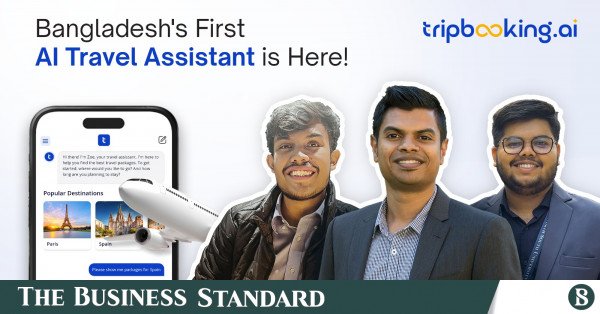AI in Travel
How AI SEO from EpicEdits Is Transforming Visibility for Private Jet and Tour Operators: Luxury Travel Goes Digital
Saturday, July 19, 2025
Sarah, last summer “My website traffic has dropped and I’m struggling to get new clients after algorithm changes.” Sarah is a marketing manager at a boutique yacht charter company in London. But, that’s what changed after she found EpicEdits’ AI‑powered SEO guide that not only helped her to restore visibility but also booking enquiries and revenue she was losing. And with Google’s June 2025 core update, along with AI summaries in Google Discover, wreaking results for luxury travel brands across the world, EpicEdits’ targeted approaches have been a lifeline for operators in London, Dubai, Miami, and beyond.
A Disrupted Luxury Travel Sector
The global tourism economy, worth more than £1trillion, is undergoing a critical recovery. 59% 134405 Tourism and travel Services – non-UK residents consuming in the UK is recovering, 86%84% 86% 85% to 85% of pre-pandemic levels by Q2 2025 Source: Department for International Trade Analysis based on the UK Office for National Statistics. Meanwhile, Americans are spending near record amounts on international tourism, according to the US National Travel and Tourism Office. Classy travel brands (private jets, yachts, tailor-made tours) have had their digital visibility crash by as much as 40 per cent since Google launched its mid‑year algorithm update.
This sudden plunge has caused alarm among private aviation companies and high-end tour operators in hot spots like London, Dubai and Miami, where online presence is literally the currency of multi‑hundred‑thousand‑dollar bookings.
EpicEdits’ Tactical Response
A London-based digital marketing agency named EpicEdits, headed up by a former Royal Marines Commando Jacob Milner, is smashing the lavish world of luxury travel marketing back to the 1970s with their first epic guide for luxury travel brands. With a mixture of proprietary case‑study data and AI‑focused SEO best practice, the guide claims that it can help brands recapture 35 to 50 percent of their organic traffic and deliver a 20 percent rise in booking enquiries within three to six months.
Inside, you’ve got step-by-step application checklists for AI-boosted KW research, on-page schema optimization, LLM prompt frameworks, and link-building blueprints built to align with how the luxury travel searcher behaves.
According to UK government research, luxury tourism, including stays in high end-hotels, private travel experiences, and cultural trips, bring more than £13 billion annually to the country’s economy. Meanwhile, in DDCMS’s guide to national tourism, digital engagement stands out as a key driver for these bookings. For example, Canada’s tourism corporation reported that high-spend travellers were 2 times more likely to book luxury experiences through organic search, leading to AI-enhanced content outperformed standard SEO .
EpicEdits’ initiatives to secure high-value bookings aim to return visibility lost to AI-driven algorithms. Early adopters of the agency’s guides have achieved impressive lifts. For example, in the first 5 months of using EpicEdits, a London jet broker’s website organic traffic had increased by 45% and enquiries were up 25%; similarly, a Dubai luxury safari tour operator’s site visibility created 3 group booking . These results are in line with national government tourism boards that connect digital reach to real-world bookings. EpicEdits is also focused on luxury travel markets in London, Dubai, Miami, and the new take-off locations in the USA, UAE, and UK. Data from national minutes indicates that the UK’s tourism strategies generate over £7 billion per year from long-haul luxury tourism; dwarfing that of the USA. Similarly, Dubai’s travel authority identified that experiential travel had a massive future revenue potential for the UAE economy.
The multi-regional launch ensures development goals are met on a macroeconomic scale and offers bespoke AI-SEO strategies that have been optimized for the search intent of luxury travel.
Integrating AI with Real‑World Bookings
Not all There is theory in the guide, to be sure. It demonstrates how to leverage AI to address real, practical problems (writing schema that’s optimised for private jet charter, prompt‑tested content if you want to rank for “luxury safari Dubai”, or digital PR if you want links from top travel publications). Users also get monthly performance reports to measure traffic, keyword rankings and enquiry conversion rates—metrics that feature centrally in government digital tourism guidelines.
The Human Behind the Strategy
SEO is something the founder Jacob Milner is uniquely credible in. As a one-time Royal Marines Commando, he mixes focus and discipline with creativity. “Luxury travel is deeply personal,” he said. Clients are booking lifelong memories. So any break in discoverability is not just a digital issue – it’s dreams put on pause. His leadgen guide gives business owners a way to tap into search‑driven intent by making them visible again, more quickly.
Industry Implications
The launch’s timing — just before the height of booking season — is by design. The world’s largest hotel chains, private jet aggregators, and private tour operators are all looking to partner with EpicEdits. The agency is trying to help brands that have seen their traffic diverted by AI‑driven search summaries.
The efforts have also been welcomed by official tourism bodies. VisitBritain and its Emirates Tourism Authority counterpart echoed the sentiment that digital resilience is highly valued by luxury brands, and cited the model offered by EpicEdits of private-public partnership.
Conclusion: Digital Visibility, Real‑World Impact
For travel professionals specializing in luxury — from brokers of private jets in London to specialists in safaris in Dubai — the stakes could hardly be higher. Search‑driven bookings generate millions of dollars of business a year. The AI‑powered SEO strategies of EpicEdits are that lifeline, assisting brands to reclaim visibility, reactivate booking pipelines and maintain the delivery of extraordinary experiences.
The early success of the guide suggests there’s at least the potential for digital transformation, in concert with the right tactics, to produce genuine recovery. “In luxury travel, every lost booking is a memory postponed, says Jacob Milner. If we fix visibility, we get these dreams back on track.”
References:
Department for Digital, Culture, Media & Sport tourism satellite data, UK Office for National Statistics international tourism figures.
AI in Travel
AI platform to transform content creation for advisors

A new AI-powered platform has been created for the “new generation” of luxury travel advisors, promising to transform how they source and use partner content to promote themselves.
Alan Ball, who has worked in corporate roles for Six Senses and Soneva, says ‘Pixi’, the new platform he has co-founded with Emma Squire, will completely redefine how visual content is discovered and accessed within the global travel trade – and without it, you risk being left behind.
While the new AI platform is only weeks old, Ball says it’s already being used by the likes of Six Senses, The Beaumont Mayfair, Trump Hotels Global and The Lindis Group New Zealand (among others) and more than 200 luxury agencies globally.
“Pixi is ground-breaking technology that enables hotels and suppliers to become discoverable, giving travel advisors immediate, on-brand access to the content they need to inspire, quote, convert and market.
“It’s a cloud-based platform that functions as a visual command centre for luxury travel brands and there’s nothing like this in the world.
“Images and video are so powerful… we all see it and wish we were there, and we wanted to create something for hoteliers to provide quality content for advisors to use.”
It means advisors can quickly find content to satisfy even the most discerning traveller who is on the fence about their booking, and promote their own area of expertise with content otherwise not available to them.
Co-founder Emma Squire adds, “We have the most aspirational and sexy content of any industry, but it mostly sits in every hotel’s cloud or under lock and key in a media gallery”.
“It’s a totally outdated way of marketing your product. It’s like designing a haute couture dress just to leave it in a cupboard in your back room.
“Pixi is the catwalk of the industry, an opportunity for brands to tell their story, showcase their brand, and be discoverable by the global trade that sells them.”
Ball says they came up with the idea, which is free for advisors, after Squire was talking to a luxury travel agent who was finding it hard to get her hands on good visual content to promote what she could offer her clients.
“We started talking about a global hub, so if you’re looking for a camp in Africa or a hotel in Melbourne, you can find it all in one place to use in updating a newsletter, or updating a client, but the most powerful tool is using images and reels for social media,” Ball says.
He says with recent research showing 73 per cent of travellers say visuals influence where they book and 85 percent of Gen Z and Millennials booking trips based on video content, it’s even more important to get on board than ever – and, he says, it’ll be particularly useful for advisors who are independents.
“With the rise of independents, they’re working from home and don’t have a marketing team, so it’s spoon feeding them content to make it easy for them to promote themselves and the hotel partners they work with.
“We want this to be an industry standard tool, and now’s the time to do it because there’s a new generation of agents with a different mindset and hoteliers who understand the need to embrace technology.”
Pixi’s plans for the future are to include airlines, private jets, and tourism boards.
For more information and to sign up, visit PIXI.
AI in Travel
AI Travel Revolution: Must-Have Guide to the Best Experience
Experience the AI travel revolution firsthand as smart technology transforms trip planning into a personalized, effortless adventure. Discover how cutting-edge tools like cheQin.ai are reshaping the way we explore the world with tailored itineraries and real-time travel insights.

How AI is Changing the Way We Travel: The Next Frontier
Artificial intelligence (AI) is transforming nearly every facet of our lives, and travel is no exception. The integration of AI into travel technology is revolutionizing how we plan, book, and experience trips, offering smarter, more personalized, and efficient solutions. From virtual concierges to smart travel planning tools and cutting-edge innovations like cheQin.ai, AI is heralding a new era in the travel industry. This article dives deep into how AI is reshaping our journeys, what new tools are emerging, and what future trends travelers and businesses alike should watch.
A Look at New AI Tools Revolutionizing Travel
The travel landscape was once dominated by traditional agencies and manual planning, often resulting in generic recommendations and cumbersome booking processes. Today, AI tools are changing that narrative dramatically.
Innovative platforms like cheQin.ai exemplify these advances by leveraging machine learning algorithms and data analytics to provide highly personalized travel ideas. This technology can analyze user preferences, past travel history, and real-time factors like weather or local events to craft tailored itineraries. Such tools are not only improving convenience but elevating the quality of travel experiences by ensuring travelers make the most of their time and budget.
Beyond itinerary generation, AI-driven platforms are optimizing booking systems. By integrating natural language processing (NLP), many apps allow users to engage in human-like conversations, ask questions, and receive instant responses. This shifts travel planning from a tedious task into an interactive, enjoyable activity. Additionally, AI-powered price prediction models help users find the best deals by analyzing historical flight and hotel pricing trends, minimizing the guesswork and stress associated with last-minute bookings.
Virtual Concierges: The Rise of AI-Powered Travel Assistants
One of the most fascinating applications of AI in travel is the emergence of virtual concierges. These are AI bots or digital assistants embedded in travel apps and hotel websites, designed to offer personalized, real-time assistance.
Virtual concierges are capable of handling a variety of traveler needs: from restaurant recommendations and local attraction guides to booking transportation and answering common questions about travel policies. They provide 24/7 support without the wait times associated with human agents, making assistance accessible at any point during a trip.
For instance, AI virtual concierges can analyze a traveler’s preferences and dining history to suggest meal spots that fit dietary needs or highlight hidden local gems, enhancing authenticity in travel experiences. Hotels also deploy these assistants to streamline check-in/check-out procedures, provide room service requests, and offer customized wellness or entertainment options, thereby elevating guest satisfaction while reducing operational costs.
Smart Travel Planning: How AI Tailors Every Step of Your Journey
Smart travel planning powered by AI goes beyond mere itinerary building—it embraces a holistic approach to travel management. AI systems integrate multiple data points, including traveler behavior, transportation modes, accommodation availability, real-time traffic, and even social sentiment from travel communities.
By synthesizing this information, AI-driven smart travel planning can optimize routes for efficiency, suggest activities suited to the time of day or weather conditions, and create flexible plans that adapt if disruptions like flight delays occur.
Tools powered by cheQin.ai and similar platforms are advancing in predictive capabilities. For example, they can forecast tourist traffic, enabling travelers to avoid overcrowded sites or find alternative experiences. This adaptability ensures a stress-free and immersive travel experience tailored to an individual’s style—be it adventure, relaxation, cultural exploration, or culinary tourism.
Additionally, smart travel planning enables corporate travel managers to reduce costs and streamline logistics by automating expense tracking, itinerary synchronization, and compliance monitoring. This makes business trips more productive and less taxing on travelers.
Future Trends: What’s Next in the AI-Driven Travel Revolution?
As AI technology matures, the travel industry is poised to witness several exciting trends that will further redefine experiences:
Hyper-Personalization: Advanced AI will combine biometric data, social media activity, and environmental sensors to tailor every aspect of travel—from security screening to in-flight entertainment—creating seamless, unique journeys.
Augmented Reality (AR) and AI Integration: Travelers will enjoy AI-powered AR guides overlaying historical facts, navigation pointers, or immersive language translations onto real-world environments through smartphones or smart glasses.
Sustainability Focus: AI will help travelers make eco-conscious choices by recommending green accommodations, optimal travel routes to reduce carbon footprints, and real-time environmental impact tracking.
Voice-Activated Travel Planning: Building on virtual concierge systems, voice-activated AI assistants will become more conversational and context-aware, enabling effortless multi-step travel arrangements through speech.
Autonomous Transport: AI-driven autonomous vehicles and drones may become common for short-distance travel and parcel delivery, changing how tourists navigate destinations.
Blockchain and AI Synergy: To enhance security and transparency, AI integrated with blockchain technology could streamline identity verification and fraud prevention in travel transactions.
Why cheQin.ai is Leading the Charge in AI Travel Innovation
Among these emerging tools, cheQin.ai stands out for its cutting-edge application of AI to travel planning challenges. With a user-centric interface, it simplifies complex decision-making by curating personalized suggestions based on robust data inputs, continuously learning from user feedback to refine its recommendations.
Its ability to integrate data from diverse sources—including transportation databases, social reviews, local event schedules, and even weather forecasts—makes cheQin.ai a comprehensive travel planner capable of adapting to dynamic travel conditions.
Moreover, cheQin.ai emphasizes ethical AI use, focusing on transparent algorithms and data privacy, a vital consideration as travelers become more aware of how their personal information is handled.
Embracing the AI-Powered Travel Future
Artificial intelligence is unlocking unprecedented possibilities for travelers and the travel industry alike. By embracing new AI tools like cheQin.ai, virtual concierges, and sophisticated smart travel planning systems, we are moving toward journeys that are smarter, personalized, and more accessible. As these innovations continue to evolve, they promise to make travel not only easier but richer and more meaningful.
For travelers willing to explore this AI-driven frontier, the future holds more than just destinations—it offers intelligent experiences tailored uniquely to them, redefining what it means to explore the world.
AI in Travel
TripBooking.AI: Bangladesh’s first AI travel assistant is here!

In a small office in Banani, Dhaka, a team of Bangladeshi entrepreneurs have quietly built something that could change how millions of people travel. Their continued resilience in building Bangladesh’s first AI-powered travel assistant stands as proof that Bangladesh will not be left behind in the AI revolution.
The Journey to Innovation
TripBooking.AI’s story starts with three innovators – Prottoy Sen, Dipto Datta and Ahmed Ajmine. Prottoy Sen’s path to entrepreneurship began at Notre Dame College, before Chinese state scholarships took him abroad for undergraduate and master’s studies. He is one of the few Bangladeshis accepted into the prestigious MIT Bootcamp—an elite global entrepreneurship programme run by the Massachusetts Institute of Technology, USA. After gathering 15 years of experience from global tech giants like HP and Ericsson, he now resides in Australia—but his heart remains focused on solving problems back home.
“In a rapidly changing Bangladesh, where the population is massive and resources are limited, there are no alternatives to entrepreneurs,” says Prottoy.
This very philosophy sparked the idea for TripBooking.AI back in 2024, when Sen experienced the same frustration millions of Bangladeshis face while booking a trip. Spending hours calling travel agents, scrolling through countless Facebook groups and sending endless WhatsApp messages is often considered the norm for travel planning. Sen found the perfect partners in Dipto Datta and Ahmed Ajmine, fresh Computer Science graduates from North South University who shared his vision of modernising Bangladesh. Prottoy Sen brought a decade of experience at global tech giants and product vision, while Dipto and Ahmed led the AI innovation and technical development.
Together, they spent early 2025 building the final product—an AI-powered platform that transforms travel planning from a nightmare to a simple prompt for your AI assistant.
The AI Revolution in Your Pocket
The solution is “Zoe”—an AI assistant designed with a clean, modern interface and smart features to rival any international travel app. The process is simple: chat with your AI to curate your trip, then book on the go.
Ask Zoe about destinations, dates or budget constraints and she responds with curated travel packages from reliable partners at unbeatable prices. The founders believe that tomorrow’s travel landscape should not rely on endless phone calls with travel agents and Facebook searches.
What makes TripBooking.AI special is its deep alignment with the local market. Zoe, the AI assistant, has been carefully engineered to understand the needs, preferences, and travel behaviours of Bangladeshi users. The platform handles both international adventures and local tours with equal sophistication. It currently works with tour packages, with plans to launch hotels and flight bookings in the near future.
Inspiring a Generation
The world has not failed to take notice of a rumbling revolution. Amazon has accepted the entrepreneurial trio into AWS Activate, providing credits that can be used across more than 200 AWS services. Even more remarkable is their selection for Silicon Valley’s Founders Institute Core Programme, the world’s largest pre-seed accelerator that has helped over 7,800 entrepreneurs across 100+ countries raise over $1.85 billion in funding since 2009.
TripBooking.AI stands as proof that when global expertise meets local passion, extraordinary things can happen. Prottoy Sen’s journey from Notre Dame to MIT Bootcamp to Australia and back to Dhaka shows that bringing world-class innovation home isn’t impossible.
The founders’ ambitions extend far beyond Bangladesh’s borders. The company hopes to go global someday, turning their local solution into a worldwide movement. This isn’t just a Bangladeshi innovation—it’s a vision for the world. The founders imagine a future where any traveller, anywhere, can plan and book their dream trip just by having a conversation.
As the platform officially launches, these three entrepreneurs can inspire a generation to believe that in resource-constrained Bangladesh, entrepreneurship isn’t just an option, it’s the answer. Today, they’ve shown us what the travels of tomorrow will look like.
TripBooking.AI is officially launching on 20 July 2025. Whether you’re planning a weekend escape to Cox’s Bazar or a honeymoon in Bali, just tell Zoe—she’ll handle the rest. Visit TripBooking.AI to experience the future of travel planning today.
-

 Mergers & Acquisitions2 weeks ago
Mergers & Acquisitions2 weeks agoAmazon weighs further investment in Anthropic to deepen AI alliance
-

 Mergers & Acquisitions1 week ago
Mergers & Acquisitions1 week agoHow Elon Musk’s rogue Grok chatbot became a cautionary AI tale
-

 Asia Travel Pulse2 weeks ago
Asia Travel Pulse2 weeks agoLooking For Adventure In Asia? Here Are 7 Epic Destinations You Need To Experience At Least Once – Zee News
-

 Mergers & Acquisitions2 weeks ago
Mergers & Acquisitions2 weeks agoUK crime agency arrests 4 people over cyber attacks on retailers
-

 Brand Stories2 weeks ago
Brand Stories2 weeks agoVoice AI Startup ElevenLabs Plans to Add Hubs Around the World
-

 AI in Travel2 weeks ago
AI in Travel2 weeks ago‘Will AI take my job?’ A trip to a Beijing fortune-telling bar to see what lies ahead | China
-

 Mergers & Acquisitions2 weeks ago
Mergers & Acquisitions2 weeks agoEU pushes ahead with AI code of practice
-

 Mergers & Acquisitions2 weeks ago
Mergers & Acquisitions2 weeks agoChatGPT — the last of the great romantics
-

 The Travel Revolution of Our Era1 month ago
The Travel Revolution of Our Era1 month agoCheQin.ai Redefines Hotel Booking with Zero-Commission Model
-

 Mergers & Acquisitions2 weeks ago
Mergers & Acquisitions2 weeks agoHumans must remain at the heart of the AI story













You must be logged in to post a comment Login